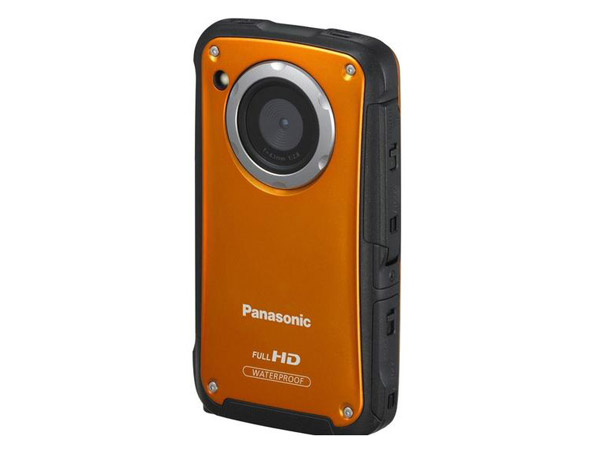Panasonic HM-TA20 review
A pocket cam that is packed with attitude


Why you can trust T3
On-the-go Panasonic pocket camcorder that's water-, shock- and dustproof
There's been a whole range of pocket camcorders released of late boasting the rugged look. This is no accident – the pocket cam market is shrinking due to smartphones featuring video functionality, so a USP is needed to entice users into parting with their cash. Panasonic is spoiling us with the HM-TA20 as there are threes unique selling points: it's dustproof, shockproof and waterproof.
Panasonic HM-TA20: Look and feel
Panasonic isn't exactly being subtle about the TA20's macho man credentials. The TA20 looks like it means business. Its chassis wouldn't look out of place in the game Bioshock; with its visible screws, metal and hardened plastic chassis, it definitely has a steampunk feel. Because of this added bulk, the cam is heavy in the hand. Weighing 155g, this may not seem much but it's a 35g heavier than most pocket cams of a similar size. What you do get with the added bulk is a decent-sized screen. At 3-inches, i t is one of the best we've encountered on a pocket cam – and it is touchscreen too, which comes in handy when shooting underwater.
Panasonic HM-TA20: Video and sound quality
Before we took a dip, we tried the TA20 out on dry, non-dusty land and had a look at the quality of the footage we shot. At 1080/30p, the imagery was not only sharp but pungent in colour. Having images filmed at 30p – and piped through a 1/4.1-inch MOS sensor – definitely helped with smoothing the footage (you can shoot at 720, 540 and 480 all at 30p) and the addition of a mini tripod in the box helped with handheld shake that's usually attributed to pocket cam footage. When you don't use this, the electric image stabiliser does a decent job, even if it has a slight bit of judder. To perk up your footage, you can choose from some filters, including sepia and black & white. They aren't needed but can be used when shooting stills at 5.3MP. A problem with the majority of mini camcorders is sound. It's good then that Panasonic has admirably compensated for this with the addition of a two-channel mic, recording to AAC.
Panasonic HM-TA20: Durability
Get all the latest news, reviews, deals and buying guides on gorgeous tech, home and active products from the T3 experts
To test the might of the TA20, we submerged it in water and covered the thing in a nice bit of garden dust. Other than looking like a Blue Peter experiment gone wrong, it didn't damage the camera in the slightest. The TA20 is capable of being dunked 10-feet deep, so you will be fine in taking the cam on most extreme sport adventures. Connectivity-wise, it took us a number of minutes to get to the HDMI, USB 2.0, earphone jack and SD card slot. To protect it from the elements, Panasonic has added a number of locks to keep the plastic port covers tight. We understand the cam needs protection but this did feel a touch like overkill. This is the only black mark on a very capable pocket cam, which will treat you well – even if you treat it badly.
Panasonic HM-TA20: £149
Link: Panasonic
Panasonic HM-TA20 Specs
- Sensor: 1/4.1-inch MOS / 5.33MP
- Lens: F2.8, 4.1 mm
- Screen (size and res): 3.0 inch (230,400 dots )
- Viewfinder (type): none
- Stabilisation (type): Electronic
- Video: MPEG-4 (1920x1080)
- Storage: SD/SDHC/SDXC
- Connections: mini HDMI, USB 2.0
- Weight/size: 64.3x112.6x17.7mm, 454g